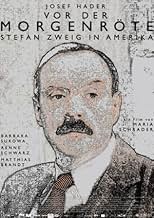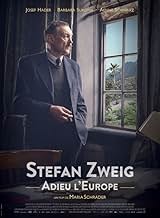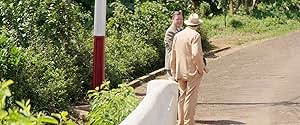AVALIAÇÃO DA IMDb
6,7/10
2,8 mil
SUA AVALIAÇÃO
Adicionar um enredo no seu idiomaBefore Dawn charts the years of exile in the life of famous Jewish Austrian writer Stefan Zweig, his inner struggle for the "right attitude" toward the events in war torn Europe, and his sea... Ler tudoBefore Dawn charts the years of exile in the life of famous Jewish Austrian writer Stefan Zweig, his inner struggle for the "right attitude" toward the events in war torn Europe, and his search for a new home.Before Dawn charts the years of exile in the life of famous Jewish Austrian writer Stefan Zweig, his inner struggle for the "right attitude" toward the events in war torn Europe, and his search for a new home.
- Direção
- Roteiristas
- Artistas
- Prêmios
- 6 vitórias e 10 indicações no total
- Direção
- Roteiristas
- Elenco e equipe completos
- Produção, bilheteria e muito mais no IMDbPro
Avaliações em destaque
The film, treated in a semi-documentary style with an accentuated preference for plan-sequences (in-camera editing of sequence-like shots), is interesting in itself. But even more interesting perhaps would be to seek, or rather to fantasize, what would have been Zweig's life had he not opted for a terminal attitude. He'd already seen the US joining the War. He probably felt that Germany would inevitably win the conflict, and this would bring about the extermination of Judaism, the end of Western-style democracies, and so on and so forth. Had he lived, however, he'd see the Allies gain the conflict, which would provide him with a breath of optimism and comfort. He'd see his adoptive country, Brazil, leaving (in 1945) a long-overdue dictatorship. Later, already an octogenarian, he'd see Brazil plunging onto another dictatorship - against which Zweig would certainly say nothing, not in the least because he was an anti-communist. One thing is certain: the writer would never live to witness the growth of the largest criminal organization ever invented in Brazil or, for that matter, in any other place. The "Land of the Future" (Zweig's book title) has been since very busy , trying hard to dump her historical promises into the trash cans of History...
--> lack of plot or interest. Great acting, dialogue, casting, etc, etc. But just too talky, boring and ultimately I no longer cared what was going to happen (although I pretty well knew in advance how things turned out, anyway).
A great film . For message, for fine exporation of immigration in war time, for acting and for the impressive solution - the mirror on the door of wardrobe as good example.
Indeed, it seems a sketch.
Good cinematography, impressive acting but not very profound, to thesistic accents.
But, for me, this is its basic virtue. The humanism of Stefan Zweig , expored, in gentle manner from inside, the essence of the great ideas reflected by his books, ambiguities poetic used, the pressure of friends and ex enemies to be helped, saved, his power accentuating his vulnerabiity.
It is more than a biographic film. For the magnificent work of Josef Hader, for the inspired perspective of Maria Schrader , it represents a wise remind of fundamental values defining our society.
Indeed, it seems a sketch.
Good cinematography, impressive acting but not very profound, to thesistic accents.
But, for me, this is its basic virtue. The humanism of Stefan Zweig , expored, in gentle manner from inside, the essence of the great ideas reflected by his books, ambiguities poetic used, the pressure of friends and ex enemies to be helped, saved, his power accentuating his vulnerabiity.
It is more than a biographic film. For the magnificent work of Josef Hader, for the inspired perspective of Maria Schrader , it represents a wise remind of fundamental values defining our society.
What a masterpiece in quiet tones, insinuation and blank spaces. And the viewer needs to fill and interpret them. What Maria Schrader did not do is a biopic by numbers, but - by showing sketches of a few days of Austrian-Jewish writer Stefan Zweig's life in exile in Brazil during WWII - what happened without a doubt to many other artists, intellectals and others who had fled the German nazi regime. Josef Hader's acting is brilliant, how he hurries from government reception to PEN congress to press conference - always keeping up appearances but beyond his friendly and modest behaviour and the thankfulness to his hosts lies despair about the state of things in europe, his uprooting and depression. Only on occasion - when he speaks with his ex-wife (absolutely wonderful: Barbara Sukowa) and a befriended journalist (likewise: Matthias Brandt) who - coincindentially - moved into the neighbourhood of his last residence, Petropolis - he finally reveals it: 'How can anyone stand this at all?'. Or, in another scene you can see it in his touched-wistful gaze when an untalented brass band gives a poor performance of 'Auf der schönen blauen Donau" ('On the blue Danube') during an improvised (and very funny) reception in a province town in the jungle. The epilogue, shortly after his and his current wive's suicide, again shows the mastery of Maria Schrader's direction: dry police procedural, shocked neighbours and officials, mourning or praying friends, Matthias Brandt reading the suicide note - a panopticon in the wardrobe mirror that occasionally shows the two dead bodies. You only sit there and you are amazed and deeply moved. What a fantastic film!
Josef Hader is one of the best actors you will ever see. Believe it. If you do not know anything about Zweig and if you want to see Hader acting, because you have not seen him before than go for this one. It is entertaining enough to sit it through somehow. And Hader is - as always - a magnet to the eyes. But apart from Haders's acting this movie is a disaster. Zweig's life has so much potential, but Maria Schrader decided to show Zweig's inner struggle with his emigration from Europe to America in 5 or 6 long snapshot-dialogues. And to deliver the message with everything what happened in Zweig's life, Schrader was forced to bend the talking in the dialogues in such a way that all information was said in some sort of everyday tittle-tattle between Zweig, his wives, and other people. So the movie gets very artificial and artistically forced. And so we got tired in our seats. It would have been much better to make a mock-documentary about Zweig (with Hader). Anyway, for lovers of great acting I recommend it, but only because of Hader's unmissable acting: to be honest, Hader could play an old sneaker resting for years in a shoe box and it would still be worthwhile seeing it.
Você sabia?
- CuriosidadesOfficial submission of Austria for the 'Best Foreign Language Film' category of the 89th Academy Awards in 2017.
- ConexõesFeatured in Women Make Film: A New Road Movie Through Cinema (2018)
- Trilhas sonorasThe Blue Danube Waltz
Composed by Johann Strauss
Principais escolhas
Faça login para avaliar e ver a lista de recomendações personalizadas
- How long is Stefan Zweig: Farewell to Europe?Fornecido pela Alexa
Detalhes
- Data de lançamento
- Países de origem
- Central de atendimento oficial
- Idiomas
- Também conhecido como
- Stefan Zweig: Farewell to Europe
- Locações de filme
- São Tomé e Príncipe(Bahia, Brazil)
- Empresas de produção
- Consulte mais créditos da empresa na IMDbPro
Bilheteria
- Faturamento bruto nos EUA e Canadá
- US$ 78.372
- Fim de semana de estreia nos EUA e Canadá
- US$ 11.729
- 14 de mai. de 2017
- Faturamento bruto mundial
- US$ 1.370.772
- Tempo de duração1 hora 46 minutos
- Cor
- Proporção
- 2:39
Contribua para esta página
Sugerir uma alteração ou adicionar conteúdo ausente

Principal brecha
By what name was Stefan Zweig: Adeus, Europa (2016) officially released in Canada in English?
Responda





































